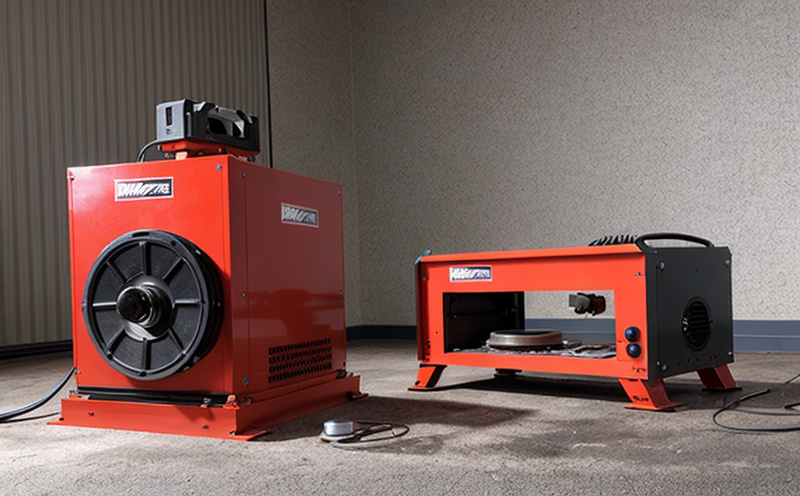ASTM D6254 Impact Testing of Cushion Materials
The ASTM D6254 standard specifies procedures for performing impact tests on cushion materials. This testing is essential to evaluate the durability and integrity of cushioning products under dynamic loading conditions, which are typical in automotive seating, furniture design, and other applications requiring resilient materials.
Impact testing helps manufacturers ensure that their cushion materials can withstand real-world stress without compromising performance or safety. The standard is widely used by quality managers, compliance officers, R&D engineers, and procurement specialists to verify the reliability of cushioning materials in various industries.
The test involves subjecting a specimen to an impact force using a pendulum with a specific weight. The pendulum strikes the sample at a predetermined velocity, simulating real-world conditions such as vehicle crashes or furniture impacts. The resulting deformation and energy absorption characteristics are critical factors in assessing the material's performance.
Understanding the impact behavior of cushion materials is crucial for designing products that meet safety standards and customer expectations. By conducting ASTM D6254 testing, manufacturers can optimize their product designs to ensure they perform consistently across different environments and loading conditions.
The test setup includes a pendulum hammer designed specifically for this standard. The hammer strikes the specimen at an angle of 90 degrees, ensuring consistent impact conditions. The sample is typically placed on a rigid support plate, which helps in measuring the energy absorbed during the impact. The equipment used must be calibrated to ensure accurate and repeatable results.
The ASTM D6254 test protocol specifies detailed procedures for preparing the specimen. This includes selecting a representative sample size that reflects the intended application of the cushioning material. Specimen preparation is critical, as any variations in thickness or geometry could affect the outcome of the test. The standard also provides guidance on conditioning the samples to ensure they are at the appropriate moisture content before testing.
The results of ASTM D6254 impact testing provide valuable insights into the energy absorption and deformation characteristics of cushion materials. These data can be used to improve product design, enhance safety features, and meet regulatory requirements. The test outcomes also contribute to ongoing research and development efforts aimed at creating more resilient and safer cushioning solutions.
Manufacturers who conduct ASTM D6254 testing benefit from a comprehensive understanding of how their products will perform under real-world conditions. This knowledge is invaluable for making informed decisions about material selection, design optimization, and quality control. By adhering to this standard, companies can ensure that their cushion materials meet the highest industry standards and satisfy customer expectations.
ASTM D6254 impact testing plays a vital role in ensuring product safety and durability. It helps identify potential weaknesses in cushion materials before they are incorporated into finished products. This proactive approach allows manufacturers to address issues early, reducing the risk of costly recalls or failures in the field.
Applied Standards
| Standard | Description |
|---|---|
| ASTM D6254-18 | This standard specifies the procedure for performing impact tests on cushion materials to evaluate their energy absorption and deformation characteristics. |
| ISO 179:2003 | An international standard that covers the dynamic testing of rigid plastics, which can be referenced for additional guidance in certain applications. |
| EN ISO 148-1 | A European standard for mechanical testing of plastics, providing complementary information on material properties. |
Customer Impact and Satisfaction
- Better informed product design decisions leading to improved performance and safety.
- Enhanced ability to meet regulatory requirements and industry standards.
- Increased customer confidence in the durability and reliability of cushion materials.
- Potential reduction in product failures and recalls, saving costs and improving brand reputation.
- Support for continuous improvement efforts through detailed test data and analysis.
Use Cases and Application Examples
The ASTM D6254 impact testing standard is particularly valuable in industries where cushioning materials are critical to product performance. Some key use cases include:
- Automotive seating: Ensuring that seat cushions can withstand the forces experienced during a collision without compromising safety or comfort.
- Furniture design: Evaluating the durability of cushion materials used in chairs, sofas, and other furniture products under real-world loading conditions.
- Sports equipment: Assessing the impact resistance of padding used in athletic gear to protect users from injury.
By incorporating ASTM D6254 testing into their quality assurance processes, manufacturers can gain a competitive advantage by producing high-quality cushion materials that meet or exceed industry standards. This not only enhances product performance but also fosters trust among consumers and regulatory bodies.
Real-world application examples include automotive manufacturers who use this test to validate the safety features of vehicle interiors, furniture companies ensuring their products are robust enough for home use, and sports brands verifying the protective qualities of their equipment.





